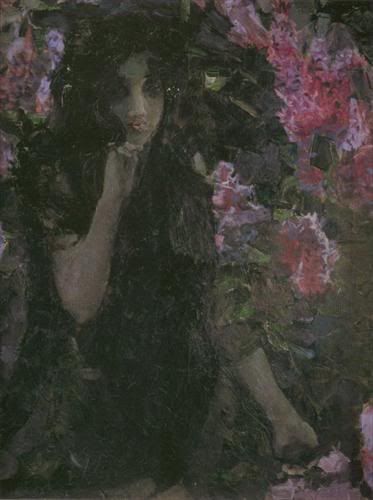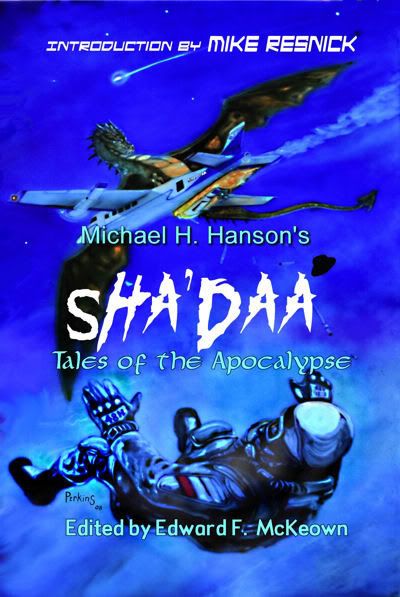Struck by Beauty
by Heather Kuehl

“You want me to do what?”
Mika’s mouth hung open as his sister repeated her words yet again.
“You need to kill Morgane. You’re the only one who can get close enough.”
He shook his head, unable to wrap his mind around the statement. His green eyes looked into hers and, seeing the finality in their depths, he sighed.
“I don’t understand why it has to come to this, Veronika. I just don’t.”
“She killed our prince and we just sat by and watched. The people are suffering under her rule, Mika.”
“So that means that we have to do something?”
“Someone has to.”
Mika sighed, running a hand through his thick red hair in frustration. The strands tickled his shoulders as he shrugged.
“Fine,” he growled. “When?”
“Petition a meeting with her tonight. Tell her that you want to discuss the advancement of men against the Seelie Court. She won’t deny your petition. She loves war.”
With a nod, Mika spun around and left his sister’s bedchamber. Veronika had always made the plans and Mika had always implemented them. Even after he joined the Unseelie Court’s army, he helped her with her plots and schemes.
But murder?
Queen Morgane had risen up by slaughtering her own family, a task that was not frowned upon by the other members of the Court. No one got in her way when she declared war on the Seelie Court. But once she killed her own son so that he would not ascend to the throne, the people started to worry.
Mika’s booted feet echoed down the cobblestone street as he walked up to the palace. His sister could use her sidhe magick to teleport anywhere she wanted. But Mika’s father was human and his mother fey. His vibrant red hair and sea-green eyes paired with his milk-white skin made him look human. His sister had the same red hair and green eyes, but her skin was the color of fresh mint. It was only his inhuman speed that made him a faerie and helped him travel up the ranks in the Unseelie Court’s army. No one was able to best him, and he liked to keep it that way.
The palace doors swung open for him, and Mika nodded at the guards in thanks. The kobolds turned away from him with the shutting of the gate, their grotesque faces watching the horizon for unwelcome visitors. He stopped by his bedchamber to put on the livery of the Court. Because he was Morgane’s most favored general, she granted him a room in the palace. Strapping his scimitars to his waist, Mika proceeded up an endless staircase to Morgane’s office. Morgane’s pixie assistant smiled at Mika as he entered, her pink eyes glowing with eager anticipation. The pixie had grown fond of Mika and, with a slight bow, used her magick to open the door.
“M’lady is awaiting you,” she said quickly. It took Mika a moment to figure out what the pixie had said.
“How did she know I wanted an audience?” he asked.
“She knows everything.”
Taking a deep breath, he stepped into her office. A large map of the Mist hung against the wall, big bold lines showing the boundaries between the Seelie and Unseelie Courts. Morgane sat on the large onyx throne that was the centerpiece of the room. As she stood, Mika dropped to one knee, lowering his eyes to the polished marble floor.
Morgane walked over to him, her bare feet never making a sound, until she was before him. Her lily-white skin was the only bright thing about her. Her black hair hung down her back, several strands moving of their own accord. Morgane reached out and tilted Mika’s head up, her black eyes penetrating his. Mika could see flecks of red in their depths. Her dress was like a cloud of gossamer smoke. It alternately clung against her body and hung away from her with every movement. She should have just been nude, the sheer dress leaving nothing to the imagination. As she knelt down it clung to her, pushing Mika’s desire up to the surface.
“What does my warrior want?” she asked. Her voice was as smooth as the finest silk. It caressed his skin, leaving goose bumps in its wake.
“An audience,” Mika breathed. He had come here for something, but his mind couldn’t remember what. He reached out a hand, wanting to caress that pale skin. She was so beautiful.
“You’ve got an audience, my soldier. What is it you wanted to tell me?” Morgane leaned against him, wrapped an arm around Mika’s shoulder, and held him against her breast. He breathed in, her scent intoxicating.
“You are so bright,” purred Morgane as she ran a hand through Mika’s hair. His body shuddered at the feeling, wanting her to touch his skin. “I had once thought of banishing you to the Seelie Court. What a powerful little soldier they would have gotten. My war would have failed without you.” Black stained lips pressed against his cheek, and Mika sighed. Pulling away, Morgane stood. Her eyes glared down at him. “But you have been a very naughty soldier.”
His breath hitched at her displeasure. “M’lady?”
Morgane flicked her wrist, and Veronika appeared in the room. Veronika’s eyes grew wide as she saw Mika on the floor, reaching out for the hem of Morgane’s gossamer dress.
“Mika?”
Morgane’s laughter pulled at things deep within Mika’s body. “You and your half-breed brother were going to try and kill me. But you know those fey, they can’t resist me.”
“What did you do to him?” Veronika growled. Mika could sense her magick mingling with Morgane’s.
“Not a thing. He is mine, Veronika. You can’t make him kill me.” A smile curved Morgane’s lips. “But…”
She turned to Mika and held out a delicate hand. “Come to me, my warrior.”
Mika wrapped his hand around hers and pulled himself to his feet. Morgane pressed the line of her body against him, resting her chin on his shoulder.
“Kill her,” she breathed in his ear. Her tongue darted out, drawing a wet line along the lobe. “For me.”
“What?” gasped Veronika. Her emerald eyes looked beseechingly into Mika’s, and she turned to run as she saw the determination within. Mika would do anything for the love of his queen. If she had only known, Veronika would have done the deed herself.
Unsheathing his sword, Mika turned to his queen. She draped herself on the onyx throne, the gossamer dress riding up on her thighs, and his imagination took hold. He shuddered as Morgane smiled. “Kill her, and that little daydream will come true.”
He rushed at his sister, lashing out with the back of his hand to send her crashing to the floor. Veronika’s lips moved as she flung out her hand. Nothing happened.
“No spell,” she breathed in surprise. “She doesn’t have you under a spell.”
Tears formed in her eyes as Mika grabbed a handful of red hair and dragged his sister to her feet. Magick rose within her, making her green eyes glow, as she tried to teleport herself out of Mika’s grip. Again, nothing happened. Morgane’s laugh echoed through the room, sealing Veronika’s fate. Wrapping a pale hand against her green skinned throat, Mika plunged the blade deep within her gut. Again and again he shoved the blade in until her middle was just a mass of meat and bone. He dropped her to the ground, her eyes gazing up at him in death.
Blinking, Mika looked down at his hands. Bright ruby red blood coated his hands, drops falling from his fingertips to the marble floor.
He turned to Morgane, who was still draped across the throne. Her laughter reached his ears and his body hummed with need.
“Come to me, my soldier,” purred Morgane. “Reap your rewards on my flesh.”
Mika stumbled over to the throne, his eyes never leaving his bloodied hands. Veronika’s blood.
“What did you make me do?” he asked in a voice that was barely above a whisper.
“I didn’t make you do anything.” Morgane held out a pale hand. “Come to me, Mika.”
His name on her tongue pulled at him, lust and desire mingling as one. He stepped over to her, bloodied scimitar still in hand, and she took his crimson hand in hers.
He blinked.
“I killed my sister.”
“That is the price you pay for plotting my death.” Her hand caressed his cheek as her lips came up to meet his. With a scream of desire, he impaled her with his scimitar. Morgane’s eyes went wide as he pulled out the blade and ran her through again. His mind replayed Veronika’s death over and over. Hot tears streamed down his cheeks as he kicked Morgane’s shuddering body to the ground. He stomped down, ribs breaking under the pressure. Morgane’s hand clawed at him, blood oozing from her black stained lips. Mika could see that she was trying to raise enough power to save herself, but it was too late. Her defenses had been down, thinking that Mika was going to take advantage of her in other ways.
Stepping back, Mika watched as her body stilled and the life left her eyes. He turned away from the bloody broken body of his former queen. The pixie assistant stood in the doorway, her transparent wings a blur of rainbow colors.
“Would you like me to call someone to take care of this, M’lord?”
Mika blinked. “Excuse me?”
“Would you…”
“No, no. I heard that. What was it you called me?”
“M’lord.”
“Why?”
“For that is what you are. You are King Mika, fey lord of the Unseelie Court.”
Mika nodded as he sunk to the floor, the realization of what he had done hitting him hard in the gut. The pixie flew away, and Mika sighed.
“Was this want you wanted?” he asked Veronika’s body as grief tore at his insides. “Did you want a fey lord to rule? Did you want me to rule? Answer me!”
The dead didn’t respond.
* * *Heather Kuehl was born near the Great Lakes, but made her way to South Carolina where she lives to this day. She is currently working on the sequel for
Fade To Black (Eternal Press). Please visit her at http://heatherkuehl.googlepages.com/malevolentdead.
What advice do you have for other fantasy writers?The advice that I have for other fantasy writers is to keep writing. Don’t get discouraged by rejection. Also, grow a thick skin and learn to take criticism. Sometimes, an editor can see a plot hole in your story that you hadn’t noticed before.








